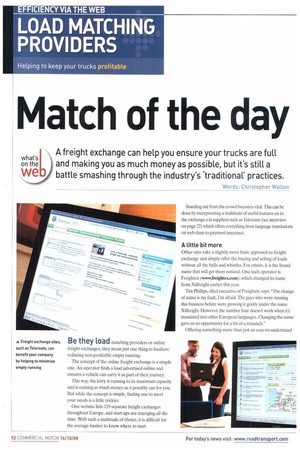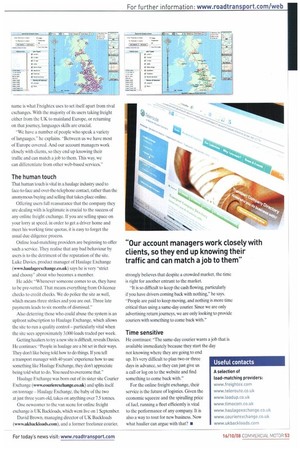Match of the day
Page 52

Page 53

If you've noticed an error in this article please click here to report it so we can fix it.
A freight exchange can help you ensure your trucks are full and making you as much money as possible, but it's still a battle smashing through the industry's 'traditional' practices.
Words: Christopher Walton Be they toad-matching providers or online freight exchanges, they mean just one thing to hauliers: reducing non-profitable empty running.
The concept of the online freight exchange is a simple one. An operator finds a load advertised online and ensures a vehicle can carry it as part of their journey.
This way, the lorry is running to its maximum capacity and is earning as much money as it possibly can for you. But while the concept is simple, finding one to meet your needs is a little trickier.
One website lists 129 separate freight exchanges throughout Europe, and start-ups are emerging all the time. With such a multitude of choice, it is difficult for the average haulier to know where to start. Standing out from the crowd becomes vital. This can be done by incorporating a multitude of useful features on to the exchange a la suppliers such as Teleroute (see interview on page 22) which offers everything from language translations on web chats to payment insurance.
A little bit more Other sites take a slightly more basic approach to freight exchange and simply offer the buying and selling of loads without all the bells and whistles. For others, it is the brand name that will get them noticed. One such operator is Freightex (wwvv.freightmcom), which changed its name from X4freight earlier this year.
Tim Phillips, chief executive of Freightex, says: "The change of name is my fault, I'm afraid. The guys who were running this business before were growing it gently under the name X4freight. However, the number four doesn't work when it's translated into other European languages. Changing the name gave us an opportunity for a bit of a relaunch."
Offering something more than just an easy-to-understand name is what Freightex uses to set itself apart from rival exchanges. With the majority of its users taking freight either from the UK to mainland Europe, or returning on that journey, languages skills are crucial.
"We have a number of people who speak a variety of languages." he explains. "Between us we have most of Europe covered. And our account managers work closely with clients, so they end up knowing their traffic and can match a job to them. This way, we can differentiate from other web-based services."
The human touch
That human touch is vital in a haulage industry used to face-to-face and over-the-telephone contact, rather than the anonymous buying and selling that takes place online.
Offering users full reassurance that the company they are dealing with is legitimate is crucial to the success of any online freight exchange. If you are selling space on your lorry at speed, in order to get a driver home and meet his working time quotas, it is easy to forget the usual due diligence process.
Online load-matching providers are beginning to offer such a service. They realise that any bad behaviour by users is to the detriment of the reputation of the site. Luke Davies, product manager of Haulage Exchange (www.haulageexchange.co.uk) says he is very "strict and choosy' about who becomes a member.
He adds: "Whenever someone comes to us, they have to be pre-vetted. That means everything from 0-licence checks to credit checks. We do police the site as welt, which means three strikes and you are out. Three late payments leads to six months of dismissal."
Also deterring those who could abuse the system is an upfront subscription to Haulage Exchange, which allows the site to run a quality control — particularly vital when the site sees approximately 3,000 loads traded per week.
Getting hauliers to try a new site is difficult, reveals Davies. He continues: -People in haulage are a bit set in their ways. They don't like being told how to do things. If you tell a transport manager with 40 years' experience how to use something like Haulage Exchange, they don't appreciate being told what to do. You need to overcome that."
Haulage Exchange was born out of its sister site Courier Exchange (www.courierexchange.co.uk) and splits itself on tonnage — Haulage Exchange, the baby of the two at just three years old, takes on anything over 7.5 tonnes.
One newcomer to the van scene for online freight exchange is UK Backloads, which went live on 1 September.
David Brown, managing director of UK Backloads (www.ukbackloads.com), and a former freelance courier, strongly believes that despite a crowded market, the time is right for another entrant to the market.
"It is so difficult to keep the cash flowing, particularly if you have drivers coming back with nothing," he says. "People are paid to keep moving, and nothing is more time critical than using a same-day courier. Since we are only advertising return journeys, we are only looking to provide couriers with something to come back with."
Time sensitive
He continues: "The same-day courier wants a job that is available immediately because they start the day not knowing where they are going to end up. It's very difficult to plan two or three days in advance, so they can just give us a call or log on to the website and find something to come back with."
For the online freight exchange, their service is the future of logistics. Given the economic squeeze and the spiralling price of fuel, running a fleet efficiently is vital to the performance of any company. It is also a way to tout for new business. Now what haulier can argue with that? lo
















































































































































































